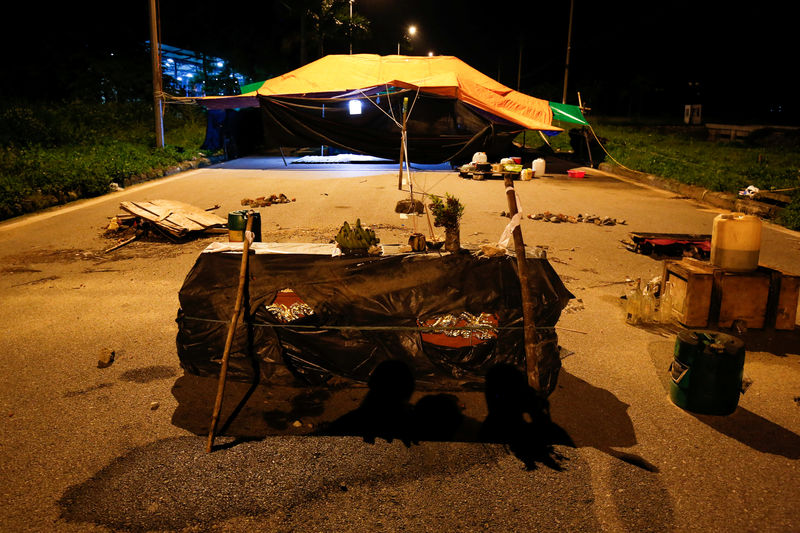By Mai Nguyen
HANOI (Reuters) - Vietnamese villagers blockading a textile plant that serves global fashion brands are seeking the permanent closure of the factory due to pollution concerns, highlighting a growing readiness in Vietnam to campaign over environmental issues.
Hundreds of people from Hai Duong, 50 km (30 miles) east of Hanoi, have kept watch in shifts day and night since April to stop work at the Pacific Crystal Textiles mill, operated by Hong Kong-based Pacific Textiles. Among those affected by the stoppage is Japanese clothing giant UNIQLO.
The blockade marks another challenge to the communist state's authority stemming from industrial pollution at a time when Vietnam is seeking more foreign investors to maintain one of Southeast Asia's highest growth rates. A toxic spill from a Taiwanese-run steel mill in central Vietnam last year sparked unprecedented protests.
The factory in Hai Duong opened in 2015 as a venture between Pacific Textiles Holdings Ltd and garment maker Crystal Group. Initial investment in the plant was reported at the time to be least $180 million.
Villagers said they started to notice a bad smell last year.
"It was an unbearably rotten, foul, pungent smell," said 60-year-old war veteran Vu Dinh Vinh. It got worse at night.
When he and others investigated, he said, they found the smell came from water discharged from the factory.
The company was fined 672 million dong ($30,000) for that December spill, according to a statement on the Hai Duong authority's website in February. Water was found to have breached limits for acidity and alkalinity balance, color, total suspended solids, chemical oxygen demand and biochemical oxygen demand.
But villagers said they were still concerned, accusing the factory of continued pollution and setting up their blockade on April 12.
When a delegation from the local authority visited on Wednesday to give the villagers a three-day deadline to move, they said they were not going anywhere.
"We want to expel the factory and never let it produce again," said 70-year-old Bui Van Nguyet.
Pacific Textiles said there had been only one discharge of waste water, on Dec. 24, 2016, and that it had not reached the nearby river. Villagers were wrong to say pollution had continued, it said.
Pacific Textiles' head of corporate social responsibility, Eugene Cheng, told Reuters steps had been taken to stop any discharge of waste water with the help of the local government.
"We did not understand the reason or motive behind them to shut down the factory as some of the villagers' relatives are also working for our factory," Cheng said.
FINANCIAL IMPACT
In regulatory announcements, the company has reported a "significant financial impact" because of the blockade at the factory, which had accounted for 10 percent of its sales.
This week, Pacific Textiles said it was waiting for the local People's Committee and industrial park to "clear the blockage".
Local authorities did not immediately respond to a request for comment.
UNIQLO owner, Japan's Fast Retailing, told Reuters it indirectly sourced fabric from the mill and had shifted production elsewhere for now. It said it had verified the steps Pacific Crystal had taken to remedy the situation after the spill.
"Fast Retailing is serious about running an ethical, sustainable business, and operates all supplier relationships under a strict code of conduct," spokesman Aldo Liguori said.
Fast Retailing believed the dispute with farmers related to the initial terms of the sale of the land, he said, adding that neither it nor Pacific Crystal was involved in discussions.
Villagers said the dispute with the local government over the sale of the land, which had been going on for more than a decade, was a separate issue.
"This is entirely about pollution," said Vinh.
Pacific Textiles did not specify which customers it supplied from the factory but its website says it has relationships with brands including Calvin Klein and Victoria's Secret. The latter's owner, L Brands (NYSE:LB), told Reuters no production for any of its brands came from the plant. Calvin Klein owner PVH Corp (NYSE:PVH) did not respond to an emailed request for comment.
Gap Inc (NYSE:GPS) said it worked with both Crystal Group and Pacific Textiles, but did not source from or work with this plant.
Attention to pollution in Vietnam has grown since last year, when a spill from a Formosa Plastics Group steel plant poisoned sea life along more than 200 km (125 miles) of coastline, prompting long-running protests.
The government has told companies they must meet environmental standards in order to stay in the country.
The state has also shown a readiness to tackle environmental campaigners, whose protests have tested the limits of strict laws to limit criticism and maintain public order. One of Vietnam's most prominent bloggers, Nguyen Ngoc Nhu Quynh, who is known by her pen name of Mother Mushroom, was jailed for 10 years this month for anti-state propaganda.

(Additional reporting and writing by Matthew Tostevin; Editing by Lincoln Feast)